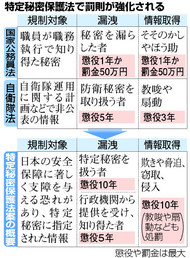 Source: asahi.com
Source: asahi.com Given the recent history of public disclosure of information in Japan (particularly after the March 2011 disasters), the concerns of the public that the government may be attempting to impose more restrictions on the ‘right to know’ are understandable. The bill, even though it has been subject to revision, does have elements that have the potential to supplant rights to ‘freedom of information’, including the possibility of an extension of the 30 year ‘official secrets’ period on recommendation from a minister (with cabinet approval), and the authority of a minister (or member of government appointed to head the organisation overseeing implementation of the law) to designate information as ‘secret’, although consensus on what constitutes a ‘secret’ has yet to be reached (despite the Abe government giving its assurances that all criteria for secrets will be clarified).
The Japan Federation of Bar Associations (along with the Social Democratic Party of Japan, academics (J), and various Asahi Shimbun editorials) has certainly made its objection to the bill (J) known, citing the fact that the bill itself does not establish any clear definitions with regard to information, and has voiced its concern that this will be used as yet another means to disguise both political and bureaucratic mistakes. Yet the reasons given by PM Abe (J) on the necessity of such legislation point to the need for official secrets, especially given that Japan has embarked on reform of its state security apparatus, with proposals to establish a Japanese NSC and relax restrictions on the export of military technology. Japan clearly wants to participate in the collection and distribution of vast amounts of intelligence with partners such as the US and (more recently) Australia, yet without safeguards in place to ensure that any disclosure will be harshly penalised, it is unlikely that other partners in intelligence would be willing to share information with Japan.
Of course, there is nothing to prevent information being leaked should a government operative decide to ‘go rogue’ and reveal state secrets out of moral concern or for personal profit (episodes of which the US and Australia have often experienced). Japanese governments are no strangers to such events (J) either, and it could be that the number and nature of leaks from within the Japanese government required an added level of assurance for other nations before intelligence sharing agreements could be brought into full effect. Under the present Self Defence Force Law, Articles 118 and 122 (J) state that any unauthorised leaking of military information (in violation of Article 59) carry either a 3 year or 5 year prison sentence, although it should be emphasised that this relates purely to military personnel, not civilians.
National (civilian) public servants in Japan are bound to preserve secrets under Article 100 of the National Public Service Act (国家公務員法) and Articles 18 and 21 of the National Public Service Ethics Act (国家公務員倫理法), with a penalty of 2 years’ imprisonment or a fine of one million yen for any violation of the obligation to secrecy. With these laws in place, adding another proviso for protection of official information seems a tad unnecessary, although the imposition of heavier penalties for unauthorised disclosure may provide sufficient deterrent to any would-be Japanese Edward Snowden. As the bill is still in the process of being debated, there is no guarantee that the final version will resemble what has been put forward to the Budgetary Committee, yet there is a greater likelihood that the final legislation will include guarantees of freedom of information (especially since the government’s own public consultations revealed that 77% of respondents were opposed to the bill in its current form, and demanded clarifications on the extent of the definition of ‘secret’).
 RSS Feed
RSS Feed